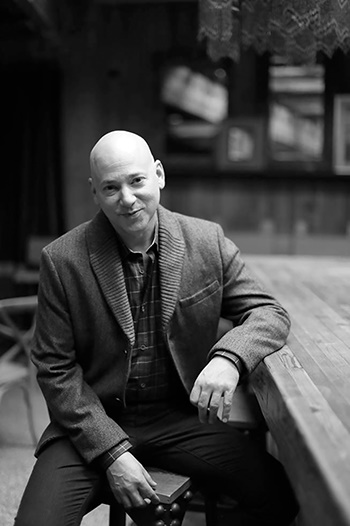Acute Myeloid Leukemia Survivor
Evan Handler’s Relentless Pursuit of Happiness
 Many people recognize Evan Handler from his roles in "Sex and the City," "Californication," countless films and Broadway productions. But what they may not know is that he is also an acute myeloid leukemia survivor. More than 30 years after his diagnosis, he’s healthy, happy and sharing his story.
Many people recognize Evan Handler from his roles in "Sex and the City," "Californication," countless films and Broadway productions. But what they may not know is that he is also an acute myeloid leukemia survivor. More than 30 years after his diagnosis, he’s healthy, happy and sharing his story.
For 24-year-old Evan Handler, it was life-altering when one of the terrible things humans fear – cancer – actually happened to him. An acute myeloid leukemia (AML) diagnosis left the rising star with a monumental decision.
“Should I push forward and remain invested in life, even with no guarantee it will pay off?”
That’s exactly what he did. Evan’s physicians recommended massive doses of chemotherapy, which resulted in achieving remission. He managed the side effects of the cancer and its treatments one day at a time.
“I held on to the promise of how sweet life could be if I could outlast the illness,” he explains. “I have said many times that if I could have known everything was going to be okay afterward, the discomfort would have been endurable, simply by knowing it was temporary. Unfortunately, that’s not usually how these things occur.”
He admits it was (and sometimes still is) difficult to live freely, and happily, with the risk of recurrence hanging over his head. He meditated and tried to convince himself a cure was possible even though he’d been told it was exceedingly unlikely. He regularly endured blood tests and the fear involved in waiting for the results. Through it all, he focused on his career.
“When I was cast to take over the lead role in Neil Simon’s play Broadway Bound on Broadway, it felt like a tremendous vote of confidence from outside myself that such a success was possible. Of course, the producers didn’t know the statistics like I did, and the leukemia did recur during the run of that show.”
More chemotherapy, followed by an autologous bone marrow transplant, led to remission a second time.
Re-emerging in his late twenties, after being absent for much of the previous four years, left Evan feeling exceptionally vulnerable.
“I was play-acting the super-heroic survivor and feeling prematurely aged by what I’d been exposed to. It’s no surprise my dating life and relationships were made up of wild swings between refusal to commit and desperate cravings for a sense of safe harbor. I had 27 breakups, spread over only 10 relationships, for an average of 2.7 per,” he jokes. But he is quick to point out it’s a joke based upon facts.
Although advocacy groups today help adolescents and young adults (AYAs) navigate relevant issues such as career and relationships, Evan wasn’t aware of that type of support at the time. Even if he had been, he isn’t sure that would have been healing for him. Instead, he has found that telling his story is highly cathartic. He has released two memoirs, Time on Fire: My Comedy of Terrors, and It’s Only Temporary: The Good News and Bad News of Being Alive. He performed the first as a one-man show.
“I didn’t set out to feel better by getting things off my chest. A lot of what I wrote was put down as a conscious act of revenge because I was angry at certain parts of my experience, and I wanted to emphasize the importance of advocating for yourself. It felt highly satisfying to have the world pay attention to it.”
Evan knows from personal experience that it takes stamina and often resources to find the best care, but he believes it’s always a benefit to do so. “Never stop asking questions, and always seek additional opinions. At least,” he urges, “supplement your care with additional sources.”
He also offers this guidance to people who want to help loved ones in treatment.
“A huge fear of mine was that I’d simply fade away, unnoticed, and be forgotten. I think it’s a great idea, and very low cost, to simply relay periodic messages to let someone know they are being thought of and are missed. Asking how you can help is a great idea, too,” he adds, “so long as you’re open to being told, ’We could really use someone to go in and clean our apartment top to bottom before so-and-so is released from the hospital.’ That’s real help, and often in shorter supply than people might imagine. It’s a BAD idea to arrive at the hospital, unannounced and uninvited, because you want to demonstrate concern. That’s an invasion of privacy, no matter how generous it might feel to you.”
Evan advises, “Your greatest assets are information, endurance and relentlessness. Find capable and compassionate medical care, and surround yourself with people who will support you. Even though I was told my AML was incurable and insurmountable, I am alive and well. And, in spite of being told I was permanently and irreversibly infertile, I am the father of a fabulous, healthy, talented daughter, conceived au naturel. There is magic and there are miracles, and neither is actually necessary for success.”


